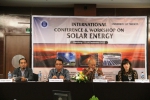The ITB SPITS Team Took First Place in the Marine Paper Competition with its Portable Solar Power Plant

The SPITS Team consists of three students: two Telecommunication Engineering 2017 students, Muhammad Miqdad Nadra and Dicky Dwi Putra, and Ramadani Putri from Geodesy and Geomatics Engineering 2018.
"As a result of Indonesia's geographical features, earthquakes and tsunamis are common occurrences. In the context of the 2018 earthquake and tsunami in Palu, multiple electrical substations were damaged as a result of the tragedy, disrupting the delivery of electrical energy. Repairs also take a long time, whereas the community's needs for electrical energy are a top priority," Dicky explained.
On the other hand, they believe that the potential for renewable energy in Indonesia is fairly significant, with solar energy being one of the least optimized. SPITS is not only effective during a crisis, but it can also be used in 3T regions where energy access is still limited.
In general, SPITS has two systems: off-grid PV and energy management. The two systems are interconnected with one another. Solar panels will collect the intensity of sunlight and store the energy in batteries, which will eventually be used by the community. This device has an output power of 80 watts.
"The energy management system will assist users in determining the amount of power, voltage, and current consumed, as well as the battery's power capacity," Dicky added.
This device has the benefits of utilizing AC (220 V) and DC (12 V) voltages, so it can be used for a variety of electrical equipment, having an energy management system, being portable, ecologically friendly, and not being noisy. The production cost is Rp3,465,000.
SPITS was created in collaboration with a number of people, including their lecturers, Wervyan Shalannanda, S.T., M.T from the Telecommunication Engineering Research Group, and Dr. Ir. Agus Purwadi, M.T from the Electric Power Research Group. The construction process also included Electrical Power Engineering 2015 alumni, notably Abdurrauf Irsal and Muhammad Alif Mi'raj Jabbar, as well as Adelia Kurniadi from Geological Engineering 2018. This device has been photovoltaic tested, and the output voltage is 224 V with a frequency of 49.9 Hz. The voltage and frequency levels comply with SPLN 1: 1995.
Dicky stated that this device is still at the prototype stage, so it can be improved in ways such as boosting power capacity and designing more features. "The good news is that the Ministry of Energy and Mineral Resources, which is also a judge in the competition," Rama said, "has promised to collaborate in developing this device."
The FTK ITS competition entitled Marine Icone began with the abstract submission stage on (26/9/2021). 45 teams were considered to have passed and advanced to the full paper selection. "The entire paper collection finished on (3/10/2021). The top ten teams proceed to the final round. At this point, we must create posters and give presentations in front of judges from the Ministry of Energy and Mineral Resources as well as ITS lecturers on (20/11/2021). The champion would be announced the next day," said Miqdad, the team leader.
Dicky and Miqdad have frequently competed in this type of event, but not for Rama. "This is something fresh and exciting for me because I have a lot to learn about developing this device, which is extremely different from my major." We established a timeline for the work to be more organized," he explained. Every accomplishment or failure experienced while competing serves as a learning experience.
Reporter: Maharani Rachmawati Purnomo (Oceanography, 2020)
Translator: Sekar Dianwidi Bisowarno (Bioengineering, 2019)

scan for download




